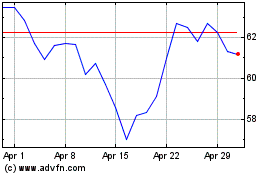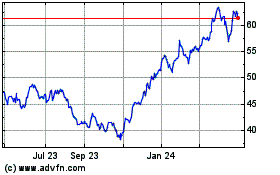Warning of a Price War Among Drug Wholesalers Sends Shares Sliding
October 28 2016 - 2:40PM
Dow Jones News
Shares of drug wholesalers were slammed Friday amid signs that a
price war has broken out in the sector, following a dour earnings
report from McKesson Corp., one of the largest pharmaceutical
distributors in the U.S.
McKesson sharply cut its annual profit outlook Thursday
afternoon, citing the decelerating rise of drug prices and internal
competition among the companies that bridge drug manufacturers with
pharmacies.
"We expect the combination of recent competitive pricing and
further moderating branded price-increase activity will have a
combined negative effect on our business by approximately $1.60 to
$1.90 per diluted share…with the larger impact coming from
competitive pricing," said John Hammergren, CEO of McKesson,
according to a conference call transcript.
"I know at least one company in our sector has been pretty
public about growing revenues above market and about regaining
market share, particularly in the independent space," Mr.
Hammergren said on the call, stopping short of singling out a
company by name.
The sounding of the alarm by McKesson triggered a selloff of the
sector's biggest players, with McKesson's share price sinking 26%,
Cardinal Health Inc. sliding 14% and AmerisourceBergen Corp.
retreating 12%. Shares of some drugmakers also declined, with an
NYSE index of pharmaceutical stocks falling 1.8% Friday
afternoon.
Garen Sarafian, an analyst at Citigroup, said in a research note
that AmerisourceBergen has been one source of increased
competition, by moving to grow its market share among independent
pharmacies.
Representatives from AmerisourceBergen didn't immediately
respond to a request for comment.
He added that prices of brand-name drugs trailed previous
estimates of a "moderate" slowing pace of price increases. Among
the cloudy outlook, he also noted that "price wars can end as
quickly as they begin."
David Larsen at research firm Leerink wasn't as optimistic about
the sector, saying "these problems are long term and the new
normal." In a note to clients, he said manufacturers "will be
reluctant to raise prices at aggressive rates for at least...[six]
more months, and our data indicate that generic price inflation
will likely remain fairly steady." He underscored that "price
competition will remain fierce."
Mr. Larsen also noted that price competition was stoked by
distribution agreements inked by the major players in the sector
like Walgreens Boots Alliance Inc. and CVS Health Corp. One such
deal in May had Wal-Mart Stores Inc. partnering with McKesson to
source generic pharmaceuticals, fending off fears that Walgreens
could snatch the business from McKesson.
"The slowdown in generic inflation is forcing the drug
distributors to become more aggressive when competing for
business," Mr. Larsen said.
McKesson's warning bodes poorly for large manufacturers, too.
With major new drug launches in relatively short supply, price
increases have become an important way for pharma and large biotech
companies to generate sales and profit growth. McKesson said some
companies have unexpectedly delayed price increases.
This news raises the stakes for the last three months of the
year. Historically, the fall has been the strongest time of the
year for drug sales, because buyers try to load up on inventory
before price increases go into effect in January.
Charley Grant contributed to this article
Write to Ezequiel Minaya at ezequiel.minaya@wsj.com
(END) Dow Jones Newswires
October 28, 2016 14:25 ET (18:25 GMT)
Copyright (c) 2016 Dow Jones & Company, Inc.
Citigroup (NYSE:C)
Historical Stock Chart
From Mar 2024 to Apr 2024

Citigroup (NYSE:C)
Historical Stock Chart
From Apr 2023 to Apr 2024
